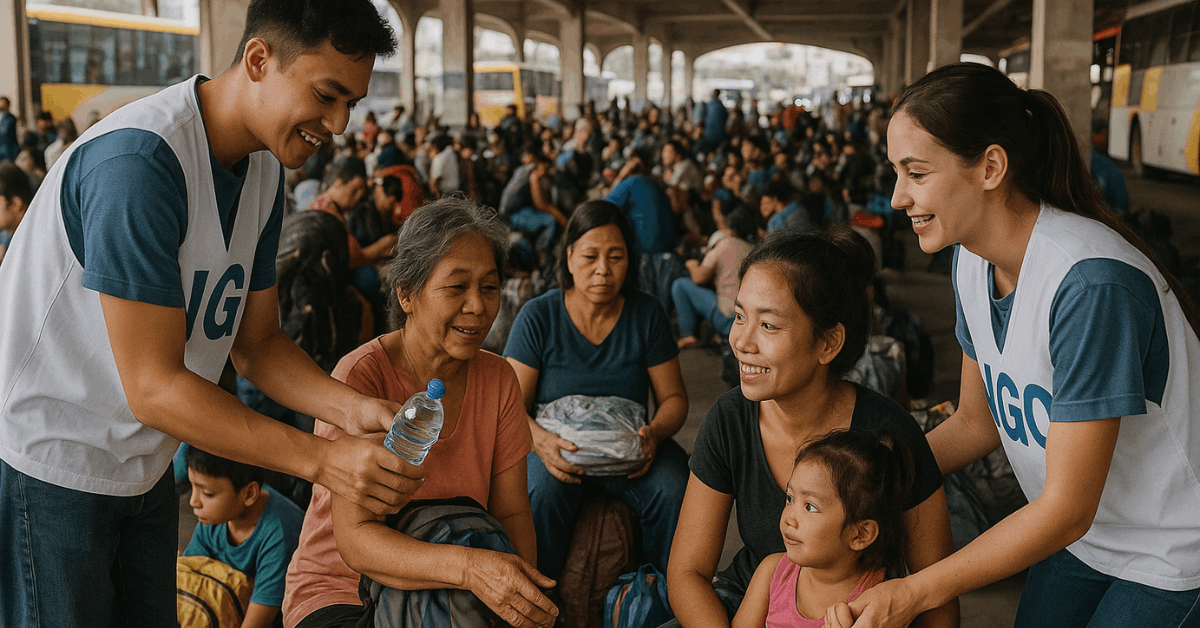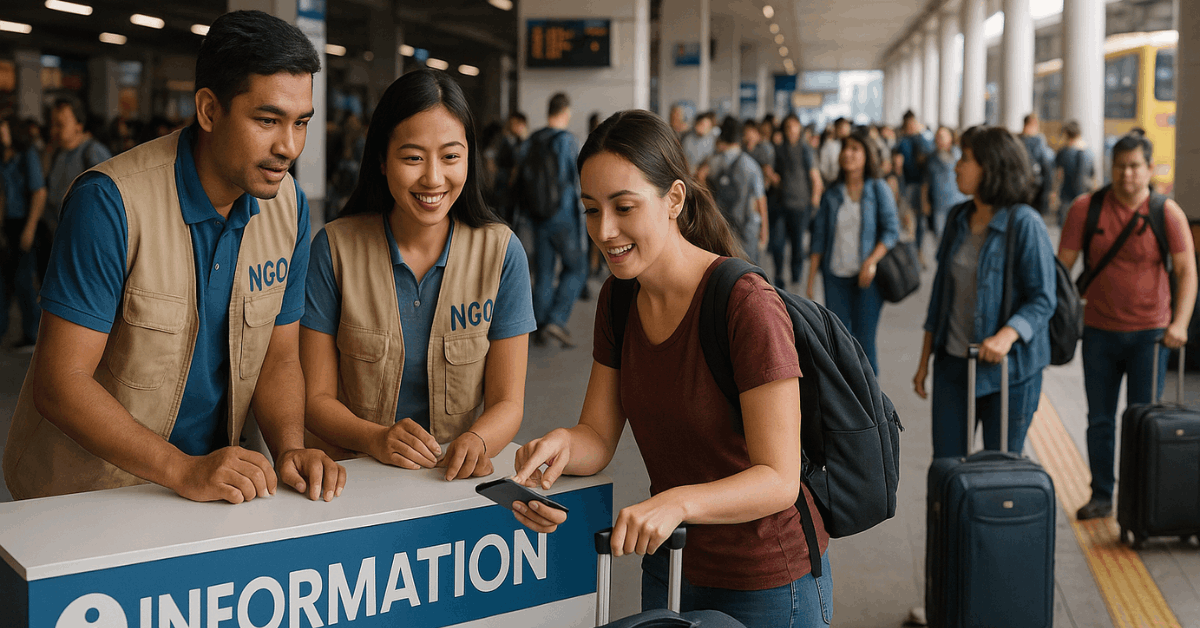Traveling can be unpredictable, especially during delays or emergencies. When such moments occur, local NGOs offer help to passengers, ensuring their safety and comfort.
These groups provide essential assistance like food, shelter, and guidance when transport systems fail.
Their actions show how organized compassion strengthens community support for travelers.

Understanding the Role of Local NGOs
Local NGOs play a crucial part in public welfare. They extend humanitarian assistance to stranded passengers in various situations.
Their missions focus on ensuring safety, dignity, and relief for those facing unexpected travel challenges. NGOs often work independently but coordinate closely with local authorities.
Common Areas of Assistance
Many NGOs offer broad services to assist travelers in difficulty. Some of the most common include:
- Food and water distribution for stranded passengers during transport delays.
- Temporary shelter for those without accommodation options.
- Medical and psychological support for passengers facing illness or trauma.
- Legal and immigration guidance for foreigners or displaced individuals.
- Transportation aid for those needing alternative travel arrangements.
Key NGOs Supporting Travelers
Various local NGOs specialize in passenger welfare. Their work ensures that help is available in bus terminals, train stations, and airports.
These groups often form alliances with transport agencies and civic organizations to expand their reach. Their partnerships show that compassion can be organized and effective.
Examples of Local Programs
Each NGO runs projects designed to assist passengers promptly.
- Help Desks: Volunteers stationed at transport hubs offer real-time assistance and directions.
- Mobile Medical Units: Teams providing basic healthcare and first aid to travelers.
- Temporary Shelter Projects: Churches and community halls open as safe spaces during travel crises.
Emergency Response and Crisis Management
In times of crisis, NGO coordination becomes essential. Whether facing natural disasters, accidents, or transportation strikes, these groups respond fast.
They mobilize volunteers and supplies to protect passengers’ safety. Their collaboration with local governments and rescue agencies ensures efficient crisis control.
Services During Crises
NGOs adapt quickly during emergencies by offering specific services such as:
- Evacuation guidance for commuters in unsafe zones.
- Emergency hotlines and temporary evacuation centers.
- Information networks via local radio or verified social media updates.
These actions reduce confusion and allow passengers to make informed decisions during chaos.
Psychological and Emotional Support
Travel disruptions often lead to emotional distress. NGOs recognize the importance of mental health and emotional care for affected passengers.
Many organize counseling sessions, support groups, and one-on-one guidance. This approach helps passengers regain calm and confidence while awaiting resolution.
Volunteer Training and Sensitivity
Handling distressed individuals requires empathy and patience. NGOs provide structured sensitivity training to their volunteers.
Workers are trained to handle high-stress situations, manage emotional breakdowns, and maintain professional compassion. This skill set strengthens the overall quality of NGO assistance.
Collaboration with Transport Authorities
Coordination with transport agencies is vital for effective aid. NGOs work alongside train, bus, and airport authorities to share real-time data and assist passengers smoothly.
This cooperation improves public safety and service delivery. It also minimizes confusion during emergencies.

Typical Joint Initiatives
Partnership programs between NGOs and transport offices commonly include:
- Information booths for assistance inside terminals.
- Joint evacuation drills for disaster preparedness and training.
- Public awareness campaigns promoting passenger safety and cooperation.
These initiatives ensure that both the public and authorities know where to turn for help.
Cultural and Community Engagement
Community-driven activities make NGO programs stronger. They integrate cultural understanding and local values into their initiatives.
These organizations use culture as a bridge to reach people from different backgrounds. It helps passengers feel welcomed even in moments of distress.
Cultural Events Held at Local Railway Stations
Some NGOs host events to promote kindness and social responsibility. Cultural shows, charity drives, and volunteer recognition days help raise awareness.
These events also encourage donations and inspire participation. They transform transport hubs into venues for unity and public service.
Promoting Volunteerism
Volunteerism remains the backbone of NGO action. Campaigns focus on recruiting local youth and commuters to join service programs.
Regular workshops teach community care, first aid, and crisis communication. Through these efforts, passengers become part of the support network themselves.
Technology and Communication Tools
Modern technology has strengthened NGO response systems. Many groups use mobile apps and social media to reach people faster.
Digital coordination tools enable quick alerts, efficient reporting, and better transparency. These innovations make humanitarian work more responsive and organized.
Benefits of Technology
Using technology helps NGOs serve passengers more effectively.
- Faster communication allows volunteers to respond instantly.
- Accurate data collection ensures accountability in operations.
- Transparency tools build public trust and encourage donations.
- Real-time coordination reduces duplication of efforts between agencies.
Funding and Resources
Maintaining aid programs requires consistent financial support. NGOs rely on donations, sponsorships, and government funding to sustain their work.
Resource allocation determines how fast and widely help can be delivered. Many organizations also depend on volunteer manpower instead of full-time staff.
Resource Management
Effective resource use ensures smooth operations during crises. NGOs apply detailed planning for logistics, supplies, and transport.
Regular audits and transparency reports keep funding credible. This approach maintains public confidence and donor loyalty.
Challenges Faced by NGOs
Despite their success, NGOs face recurring operational hurdles. Limited funding, manpower shortages, and coordination issues remain common problems.
Responding to large-scale emergencies can stretch their capacity. Still, these organizations continue adapting to ensure consistent and reliable service.
Overcoming Barriers
Resilience is built through planning and collaboration. NGOs strengthen ties with private companies and local leaders for more support.
Regular fundraising campaigns and digital drives sustain daily operations. Improved logistics systems ensure that aid reaches passengers quickly.
Future of NGO Assistance in Transportation
The future looks promising for NGO participation in transport safety. New strategies focus on inclusive and tech-driven aid.
Expansion plans aim to cover more rural routes and underserved terminals. NGOs are also preparing for greater climate-related challenges affecting travel.
Innovations and Trends
These advancements show how NGOs continue evolving to meet modern travel realities.
- AI-based alert systems for disaster prediction.
- Broader inclusion for passengers with disabilities.
- Cross-border regional partnerships for humanitarian coordination.
A Network of Compassion and Hope
Local NGOs have become an essential lifeline for passengers in distress. Their role blends humanity, organization, and dedication to community care.
Every act of assistance reinforces the message that help is always near when people unite for good. Supporting their work ensures safer, kinder journeys for everyone.











